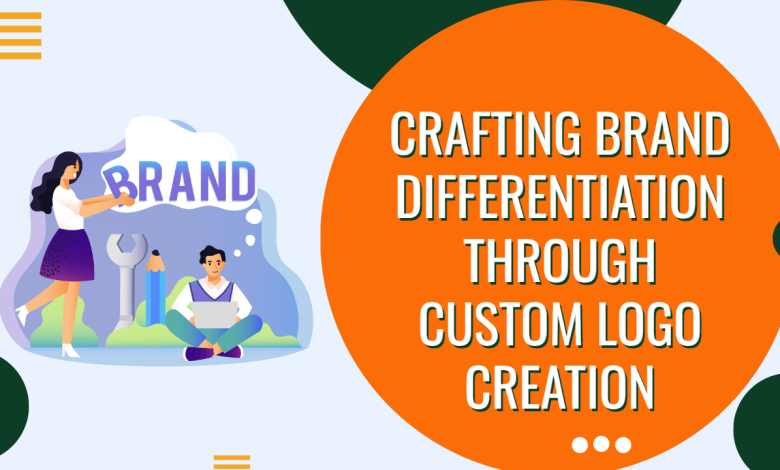Crafting Brand Differentiation through Custom Logo Creation

In the ever-evolving world of business, where competition is intense, standing out is a strategic imperative. Crafting brand differentiation is a nuanced process, and one powerful tool in achieving this is through the creation of a custom logo. This article navigates the intricacy of brand differentiation through custom logo, emphasizing the profound impact of bespoke logos on a brand’s identity and success.
Understanding Brand Differentiation
At its core, brand differentiation is about establishing a unique identity that sets a brand apart from its competitors. It goes beyond offering products or services; it’s about creating an emotional connection with consumers. In an era where consumers are inundated with choices, to create a custom logo becomes a key aspect of brand differentiation. This custom logo serves as a visual representation of the brand’s unique identity, fostering loyalty and influencing purchase decisions.
The Role of Logos in Branding
Logos serve as the visual face of a brand. They encapsulate the essence of a business, conveying its values, personality, and promise to consumers. Iconic logos, such as the golden arches of McDonald’s or the dynamic swoosh of Nike, have transcended mere symbols—they have become cultural phenomena, influencing consumer perception on a global scale.
Common Logo Design Trends
Staying abreast of design trends is essential for relevancy, but blind adherence to trends can be counterproductive. This section delves into the current landscape of logo design trends, offering a critical perspective on the potential risks of losing uniqueness in the pursuit of trendiness.
Benefits of Custom Logo Creation
Choosing a custom logo over generic or template-based options brings forth a multitude of benefits. The foremost advantage is the establishment of uniqueness and exclusivity. A custom logo is tailored to the brand’s specific values and offerings, creating a distinctive visual identity that resonates with the audience. Beyond aesthetics, a custom logo has the power to forge an emotional connection with consumers, fostering brand loyalty and advocacy.
Key Elements in Custom Logo Design
Color psychology plays a pivotal role in logo design, influencing how consumers perceive and interact with a brand. This section takes a deep dive into the psychological impact of colors, offering insights into how businesses can strategically use color to convey their brand message. Additionally, the choice of typography in a logo is explored, highlighting how different fonts can communicate various aspects of brand personality.
Working with Professional Designers
While DIY logo tools exist, the collaboration with a professional designer elevates the logo creation process. Professional designers bring expertise, ensuring that the logo not only aligns with the brand’s vision but also captures the nuances of its personality. The synergy between the brand and the designer results in a visual representation that goes beyond aesthetics—it becomes a strategic asset for the business.
Avoiding Design Pitfalls
Even with the best intentions, design mistakes can dilute the effectiveness of a logo. This section meticulously dissects common pitfalls, from overly intricate designs that lose scalability to color choices that may confuse rather than convey. The emphasis here is on simplicity, ensuring that the logo remains versatile and impactful across various applications.
Case Studies of Successful Logo Differentiation
The best way to understand the power of custom logos is to examine real-world examples. Case studies of brands like Coca-Cola and Starbucks shed light on how these industry giants have successfully utilized custom logos to differentiate themselves in competitive markets. Lessons learned from their branding strategies offer valuable insights for businesses seeking to carve their unique niche.
Implementing the Custom Logo Across Branding Channels
Consistency is key when implementing a custom logo across different channels. Whether online or offline, maintaining a cohesive brand identity strengthens recognition and reinforces brand values. This section provides practical strategies for adapting logos to diverse marketing materials without compromising the core message.
Measuring the Success of Brand Differentiation
Effective brand differentiation should be measurable. Defining key performance indicators allows businesses to assess the impact of their unique logos on consumer perception, market share, and overall brand equity. Real-world examples illustrate how businesses can successfully track and analyze these metrics for informed decision-making.
Challenges in Maintaining Brand Differentiation
In a rapidly changing market, preserving brand differentiation is an ongoing challenge. Businesses must navigate evolving consumer preferences, cultural shifts, and emerging trends while safeguarding their unique identity. Strategies for overcoming these challenges are explored, ensuring that brands stay relevant and distinctive over time.
Future Trends in Logo Design and Brand Differentiation
The future holds exciting possibilities for logo design. Emerging trends, from minimalist designs to interactive and dynamic logos, provide a glimpse into what lies ahead. Anticipating these trends allows brands to proactively adapt, ensuring continued relevance and differentiation in a dynamic market.
Now that we’ve explored the process of brand differentiation through custom logo, let’s jump to the conclusion.
Conclusion
In conclusion, the journey of crafting brand differentiation through custom logo creation is an investment in the long-term success of a business. A unique and well-crafted logo becomes more than a visual identifier—it becomes a symbol that resonates with consumers, fostering trust, loyalty, and a lasting connection.
FAQs
How does brand differentiation affect consumer perception?
Brand differentiation shapes how consumers perceive a brand, influencing their emotional connection and overall impression of the business.
Can a custom logo help a brand connect with a specific target audience?
Absolutely. A custom logo, tailored to reflect the values and preferences of a target audience, enhances the brand’s connection with that specific demographic.
What role does cultural relevance play in custom logo design for global brands?
Cultural relevance is crucial. Global brands must ensure that their logos resonate across diverse cultures by incorporating universal symbols and avoiding culturally specific elements.
Is it advisable for established brands to undergo a logo redesign for differentiation?
It depends on the brand’s goals and the evolving market landscape. While established brands may not need frequent redesigns, periodic evaluations, and adjustments can ensure continued relevance.
How can small businesses with limited budgets invest in custom logo creation for differentiation?
Small businesses can explore affordable design options, such as freelance designers or crowdsourcing platforms. Prioritizing simplicity and core brand values can also lead to effective logo creation within budget constraints.
Also, read:
Demystifying Corporate Tax Filing: A Comprehensive Guide









